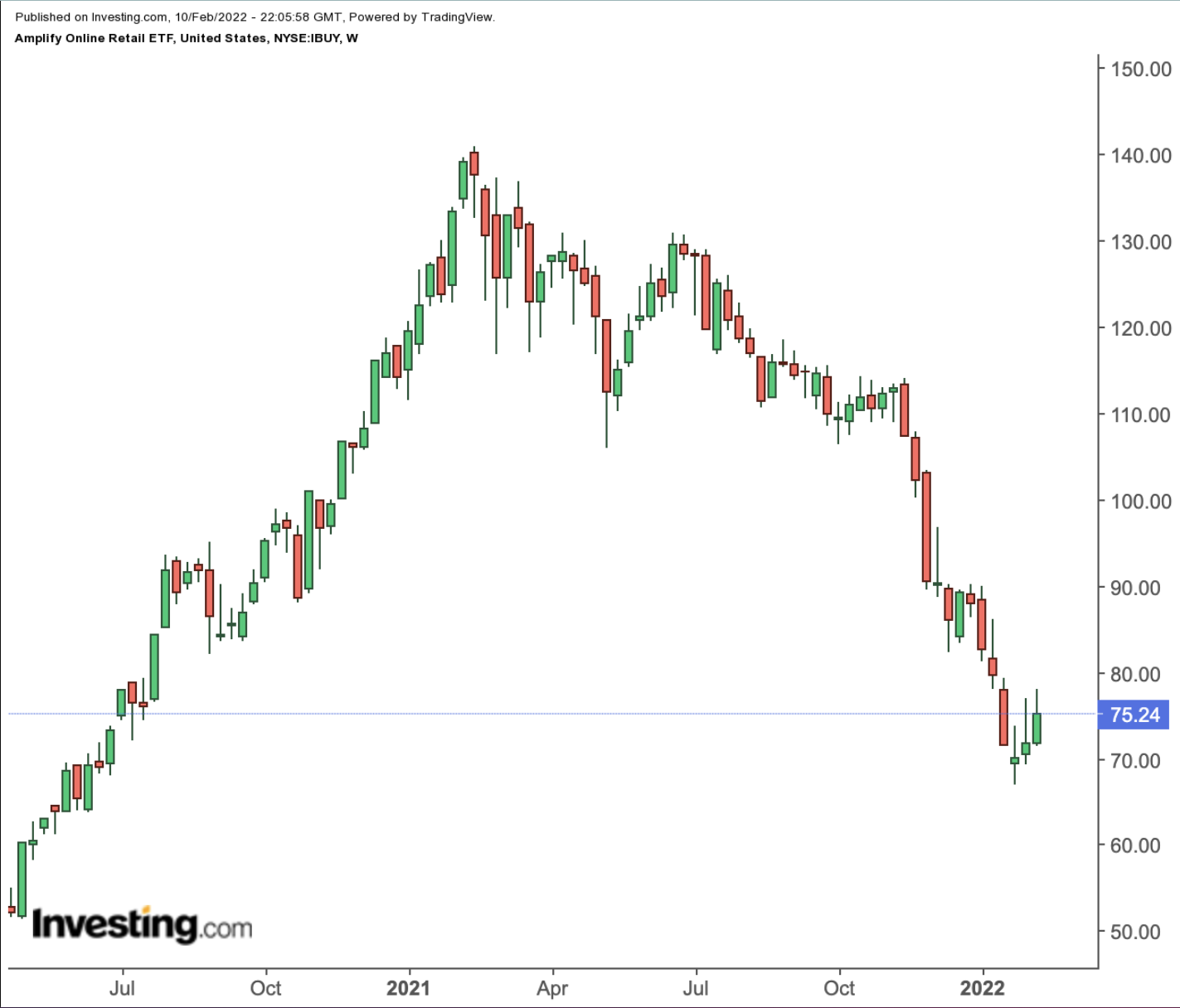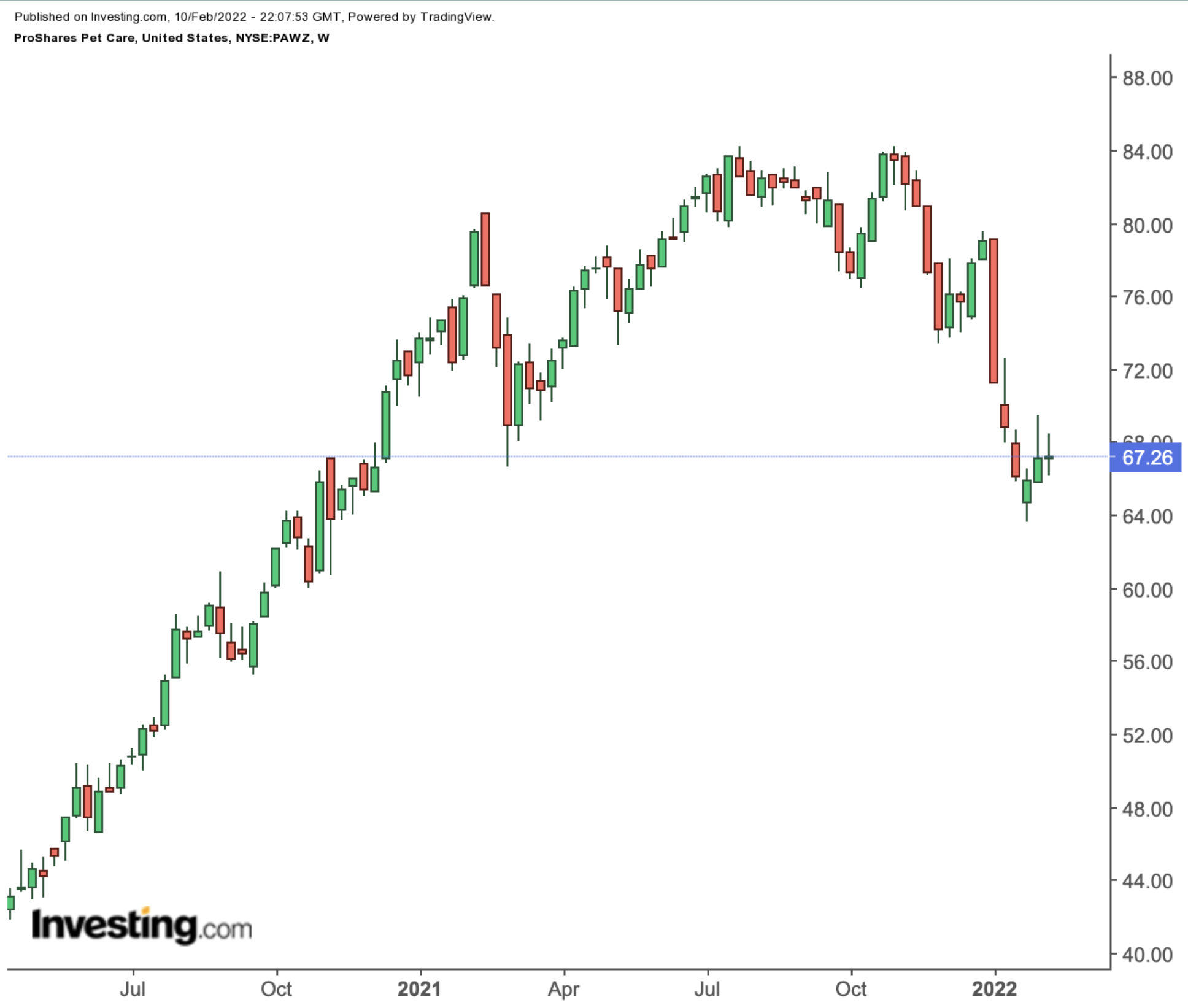Many people have marked Valentine's Day, Feb. 14, on their calendars. The annual festivity has evolved to one of the year’s most lucrative shopping seasons in the US. Therefore, Wall Street pays close attention to which companies could benefit from it.
Recent numbers by the National Retail Federation (NRF) reveal that this year’s Valentine’s Day spending could reach almost $24 billion, up from $21.8 billion in 2021. Americans are buying “gifts for partners, friends, pets and more.”
In addition, over half of US consumers plan to celebrate Valentine’s Day and spend around $175 per person on popular gifts, such as candy, greeting cards, and flowers. Finally, shoppers are also likely to see ads for eco-friendly gift options—a trend that could lead to more sustainable celebrations in the years ahead.
With that information, today’s article introduces two exchange-traded funds (ETFs) that could benefit from this year’s Valentine’s Day spending.
1. Amplify Online Retail ETF
- Current Price: $75.24
- 52-week Range: $66.88 - $141.00
- Expense Ratio: 0.65% per year
E-commerce sales add to about 14% of all retail sales in the US, 27% in the UK, and approximately 25% in China.
Our first fund, the Amplify Online Retail ETF (NYSE:IBUY), invests in global businesses that generate 70% or more of their revenue from online sales. The fund was first launched in April 2016.

IBUY, which has 79 holdings, tracks the returns of the EQM Online Retail Index. The top 10 stocks account for roughly a quarter of net assets of $494.2 million. In terms of sectors, we see traditional retail (50%), followed by the marketplace (40%) and travel (10%).
US-based companies comprise almost three-quarters of the portfolio, which also comprises companies from China, Germany, Japan, and the UK.
The leading names on the roster include travel platforms Expedia Group (NASDAQ:EXPE) and Booking.com (NASDAQ:BKNG); online marketplace Groupon (NASDAQ:GRPN); e-commerce giant Amazon (NASDAQ:AMZN); and alternative accommodation and travel platform Airbnb (NASDAQ:ABNB).
IBUY declined 45.3% over the past 12 months, hitting a 52-week low on Jan. 28. And year-to-date (YTD), the fund is down 15.8%. Buy-and-hold investors who want global exposure could consider investing around these levels.
2. ProShares Pet Care ETF
- Current Price: $67.26
- 52-Week Range: $63.56 - $84.24
- Dividend yield: 0.21%
- Expense ratio: 0.50% per year
On Valentine’s Day, a large number of pet parents plan to shower their beloved furry friends with gifts. For instance, a 2020-poll shows that around 58.6% of Brits will buy a ‘present’ for their pets, while only 23% will do the same for their partners.
American consumers will also spend close to $1.2 billion on their pets this Valentine’s Day.
Finally, recent research suggests China’s pet food market will expand 10% annually on average over the next two years, compared to only 4% in the United States.
The ProShares Pet Care (NYSE:PAWZ) gives access to global companies positioned to benefit from an increase in pet ownership and spending. The fund started trading in November 2018.

PAWZ currently has 33 holdings. The leading 10 names account for almost two-thirds of about $262 million net assets. In other words, it is a top-heavy fund.
Veterinary pharmaceutical companies (20.90%) lead the portfolio. Other sectors are internet pet and pet supply retail (13.77%), veterinary diagnostics (12.68%), and pet food manufacturing (10.73%).
Idexx Laboratories (NASDAQ:IDXX), which focuses on veterinary as well as water markets; Zoetis (NYSE:ZTS), which manufactures medicine for animals; UK-headquartered Dechra Pharmaceuticals (OTC:DPHAY); online pet supplies retailer Chewy (NYSE:CHWY); and fresh pet food name Freshpet (NASDAQ:FRPT) are among the top names in the ETF.
In the past 12 months, PAWZ declined by 11.8%. It is also down 13.5% YTD. Long-term investors could regard the recent decline as an opportunity to invest in some of the top names serving the pet market.
